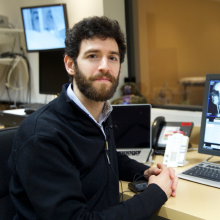Human Health
Research areas description
A magnetic resonance imaging (MRI) system contains a powerful magnet that allows clinicians to see inside the body. The magnet is usually three teslas in size (a tesla is the unit used to measure the strength of a magnetic field). MRI systems with seven teslas have recently been introduced. These advanced MRIs can help clinicians detect subtle pathologies that traditional systems can’t see, such as tiny yet destructive multiple sclerosis lesions. The problem is that these powerful systems are much more difficult to use “out of the box” and require highly experienced operators.
As Canada Research Chair in Quantitative Magnetic Resonance Imaging, Dr. Julien Cohen-Adad aims to develop innovative, critical hardware and software so that this technological marvel can become a standard tool for radiologists. He and his research team hope that by making seven-tesla MRI systems easier to use, their research will enable earlier disease detection and diagnosis, improving patients’ health outcomes.
Research staff
- Julien Cohen-Adad | Chairholder
- Nikola Stikov | Member
Specialized equipment
- 3T and pre-clinical 7T MRI
- Radiofrequency laboratory for building MRI coils
- GPU cluster for research in deep learning applied to medical image analysis
External sources of funding
CIHR, NSERC, FRQS
News about Tier-2 Canada Research Chair in Quantitative Magnetic Resonance Imaging
Press review about Tier-2 Canada Research Chair in Quantitative Magnetic Resonance Imaging






